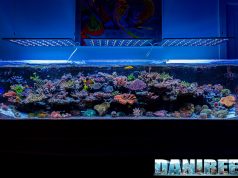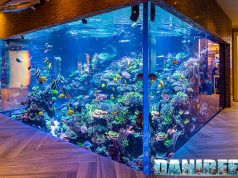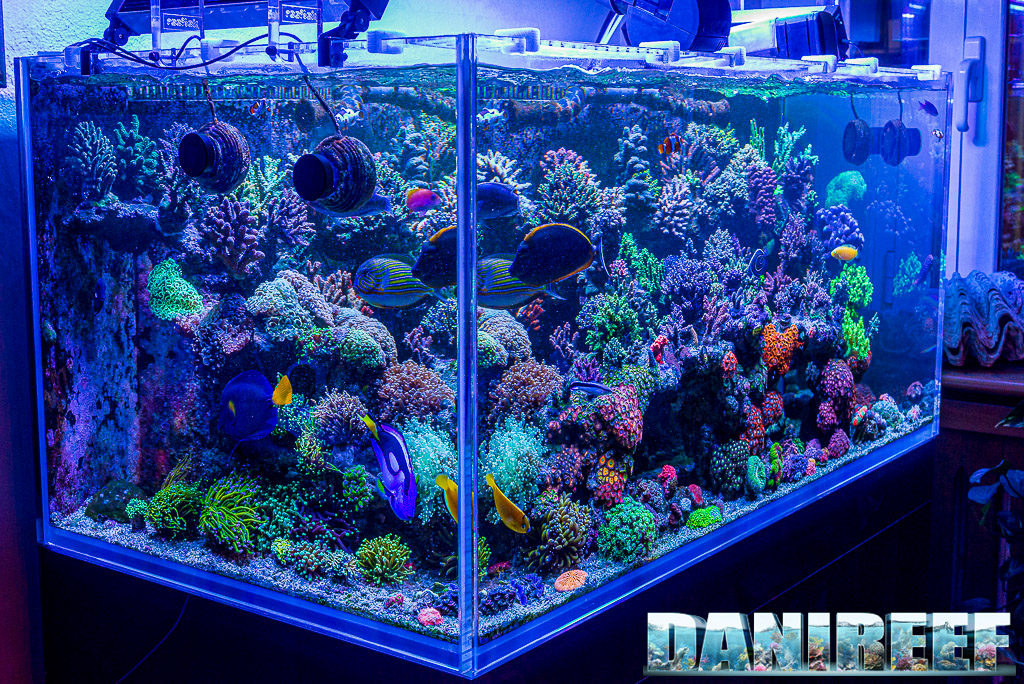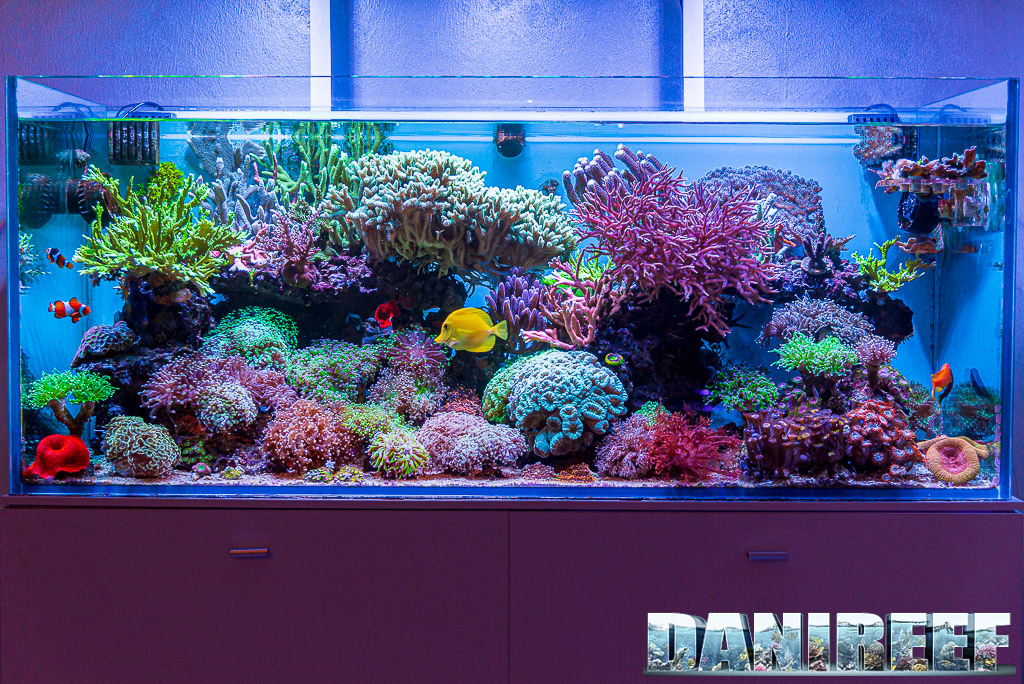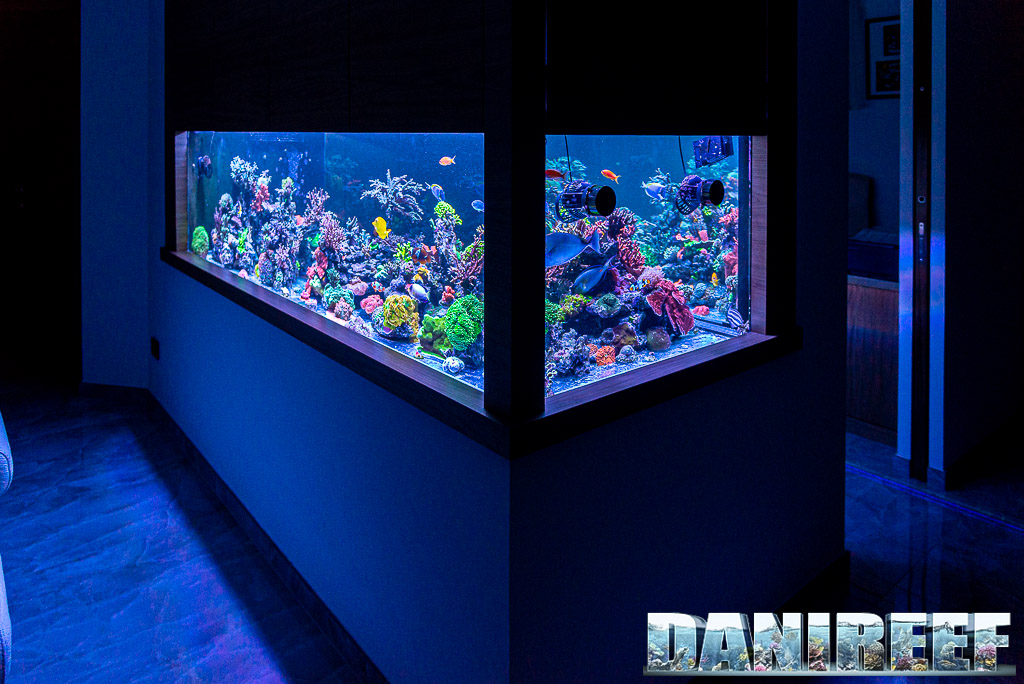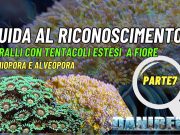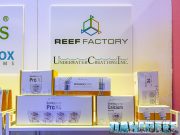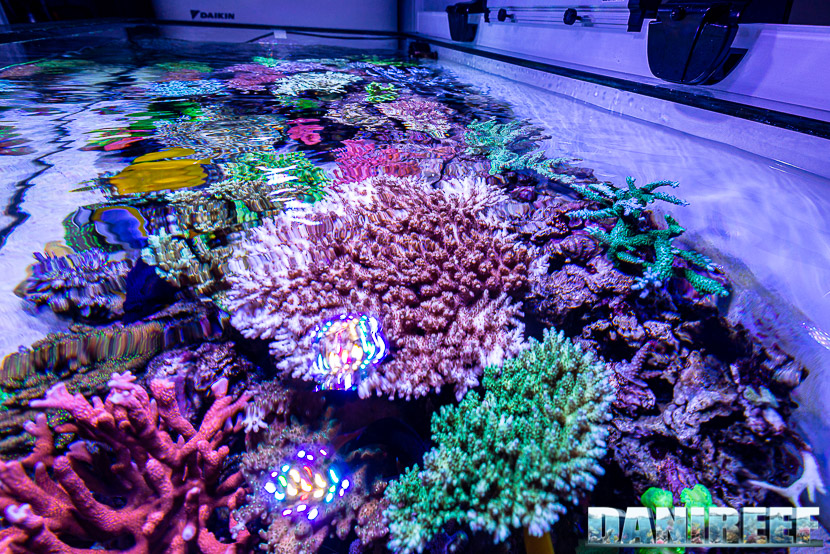
This is a spectacular aquarium, we’re completely speechless, but we hope that our pictures will do it justice.
This article is also available in: italiano
We’re going to present Marco‘s aquarium, known as Marco Vank, the bolognese guy that created this absolute beauty. It literally is over the roofs of Bologna, unluckily when we visited the aquarium the weather wasn’t the best and we couldn’t take pictures of the bolognese background. But believe us on the word, the sight was amazing. We promise we will return.
We can’t speak about the aquarium without mentioning its sizes. The tank is 130x70x50(h) for a total of 455 gross liters. The tank is made of extraclear glass of 12 mm and double bottom of 10+10 mm. It also has a tie-rod on each side as it’s visible from some pictures. This feature fixes two problems that we normally have in our aquariums: the first, technically speaking, is the endurance of the aquarium, the second is about the fish jumping out of the aquarium.
While we were watching the aquarium, open mouthed and completely captured by its magnificence, Marco told us that it has been made especially for hard corals SPS, acropora in particular, very beautiful and of every kind. But you will see in our pictures.
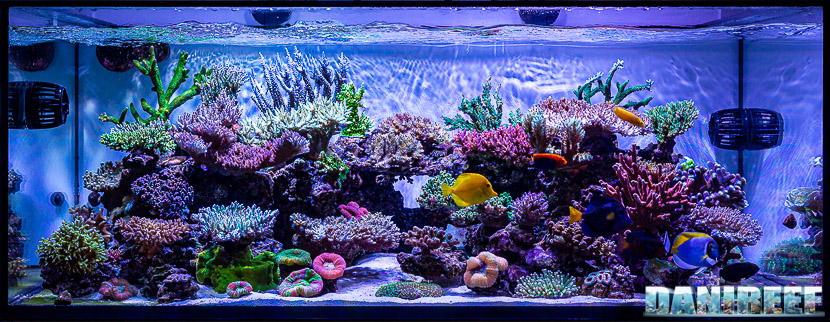
The used Technique
The aquarium of 130x70x50(h) cm in 12 mm glass, tie-roped and with double bottom, and the forniture itself have been made by Hobby Acquari of Bologna. The sump is 59x53x45, with slider and water passage hole with adjustable level. The refilling tank is 16x53x45 for a maximum of 35 liters.
For the movement of the water there are two movement pumps Ecotech Marine Vortech MP40qd of 17.000 l/h. The movement is 37 times the volume, the best for hard corals SPS. Thanks to the Reeflink (review) the kind of flow changes every 6 hours to simulate what happens in nature for real. The living rocks are 70 kg and assure a very efficient filtration.
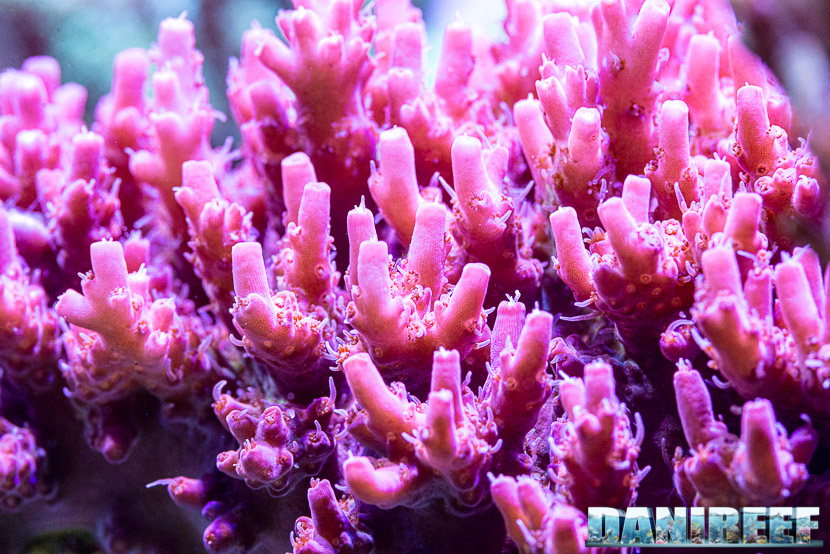
The lighting is given by a couple of Radion G4 Pro turned on for 12 hours a day, with an hour of dawn and one of sunset.
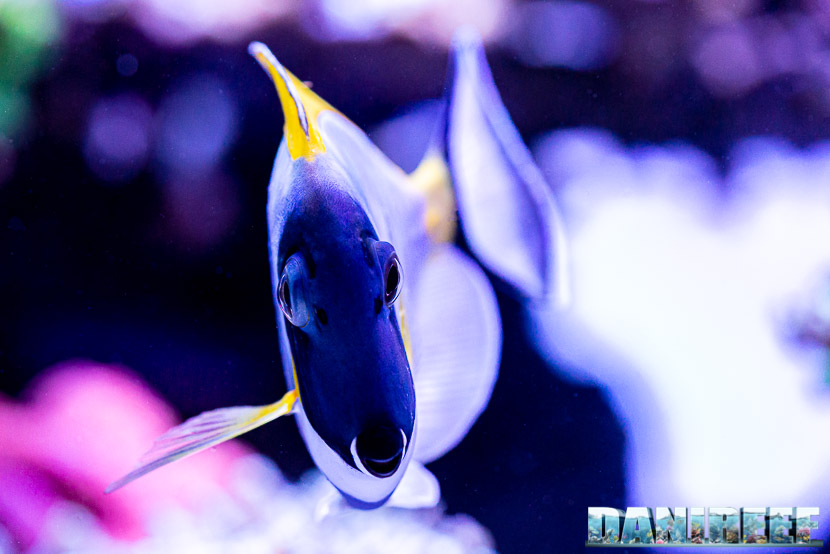
The exchange between aquarium and sump is handled by a Jebao Jecob DCS 4000 pump set at its maximum power. The maximum flow rate is 4000 l/h and the hydraulic head 3,2 meters. According to our program (here in italian), the aquarium should have an exchange of 900 l/h. Maybe a little poor for the skimmer that Marco uses.
The drain is about 50mm and empties the water directly inside a roller filter, the electric Rollermat by Thelling, which again leads to the sump. In order not to have sediments inside the roller Marco placed two movement pumps that avoid the risk of stagnant water, and a third under the base that holds it in sump.
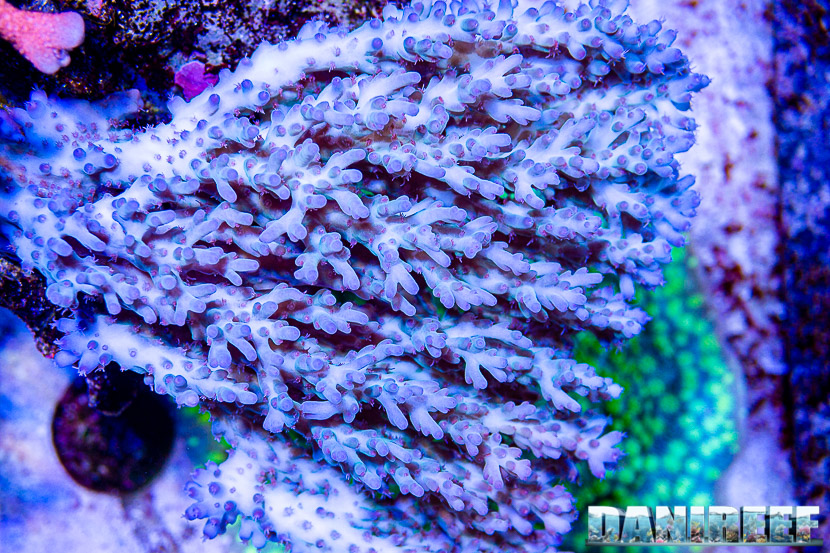
But for what concerns the integration of the various trace elements for the growth of the corals, Marco chose the balling system by Triton (here a guide in italian), using the product line Triton Core7 Other Methods provided by a doser, 4 channel pump by Aqua Trend, the Doser One Evolution 4ch.

The Teco TK1000 chiller (italian review) manages the temperature running cooling and heating. For cooling the aquarium it turns on at 25,2°C and it turns off at 24,5°C, so with an hysteresis of 0,7°C.
The heating is given to the heater inside the chiller and to an addictional external heater of 400W placed in sump. The heater is connected to the temperature controller T Controller Twin by Aquamedic, which starts the heater and 4 cooling vents in case the temperature touches 26°C (but it’s improbable thanks to the chiller).
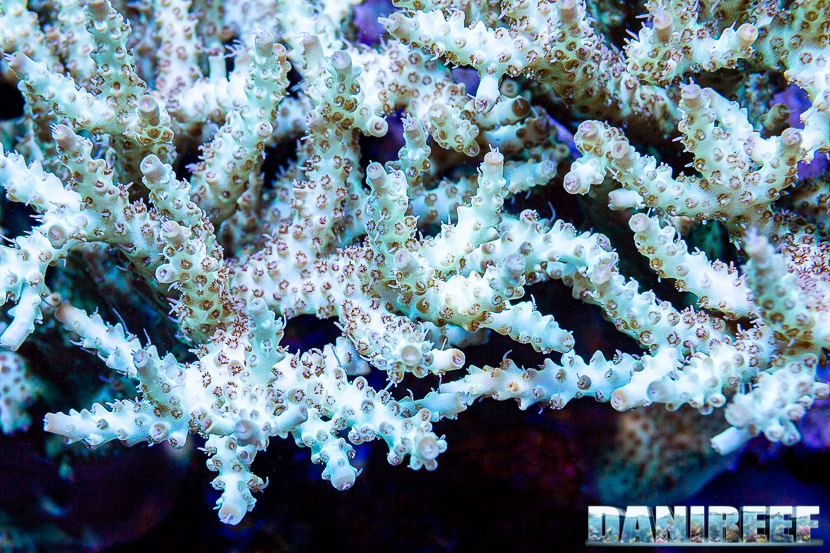
The skimming is given to the Bubble King 200 Double Cone with its pump Mini Red Dragon 1200, connected to an ozonizer Sander C50, which in turn is helped by an external aerator. Moreover, there’s a UV system by Newa of 18W on 24/7.
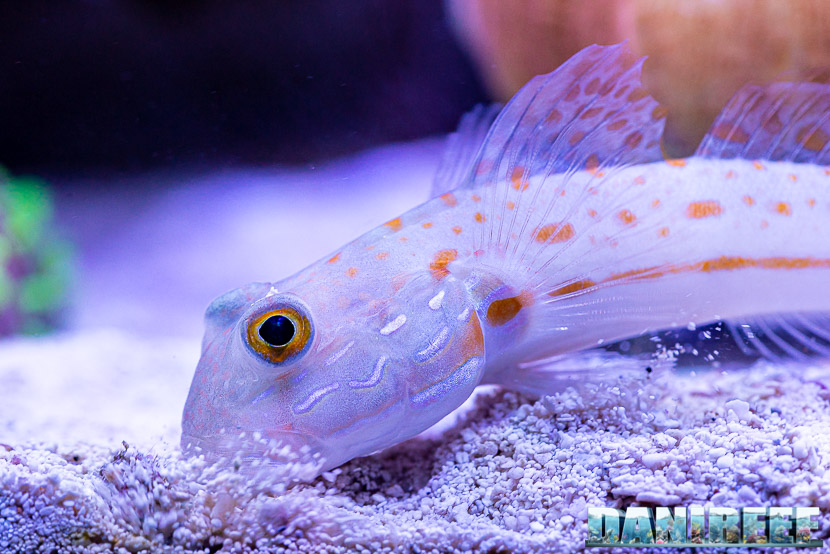
In sump there’s also a Zeolite reactor by Ultra Reef, filled with 500g of Zeolite, substitued once a month, and a fluidised bed Phosban Reactor, always working, but it’s refilled with phosphate resins when needed. There’s also a bag of 500ml of active carbon, changed once a month. The refill is managed by a system Osmolator 3155 by Tunze.
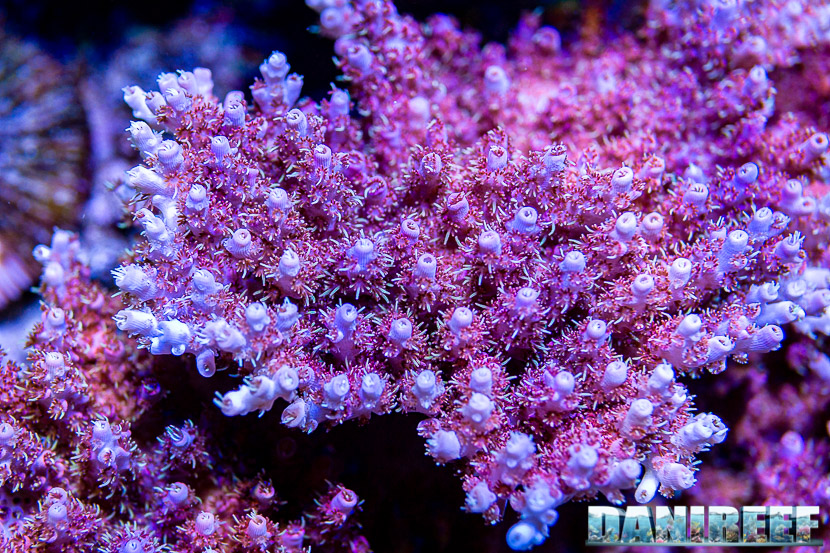
The values in aquarium
Marco keeps these values in aquarium:
- KH: 7
- Ca: 430
- Mg: 1300
- NO2: 0
- NO3: da 0 a 0,2
- PO4: da 0 a 0,01
- Salinity: 1027 – 36 per thousand
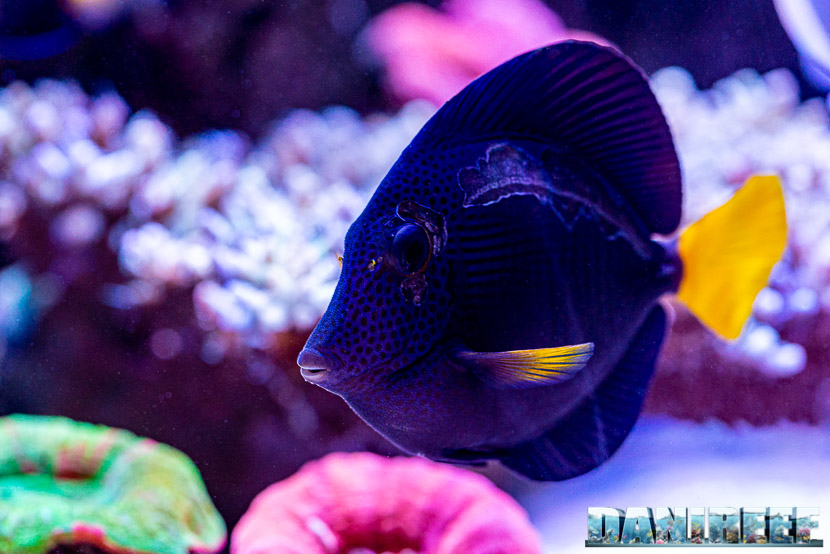
The chemical values are stable and measured twice a week. Then every three months are done the ICP and N-DOC test, always by Triton, to keep in control all the aspects of the aquarium. On the base of the ICP are also calibrated metals like Li, Mn, Mo, I, B, Sr, K and depending on the results of the test Triton N-DOC are also used the BIO-BASE ULNS.
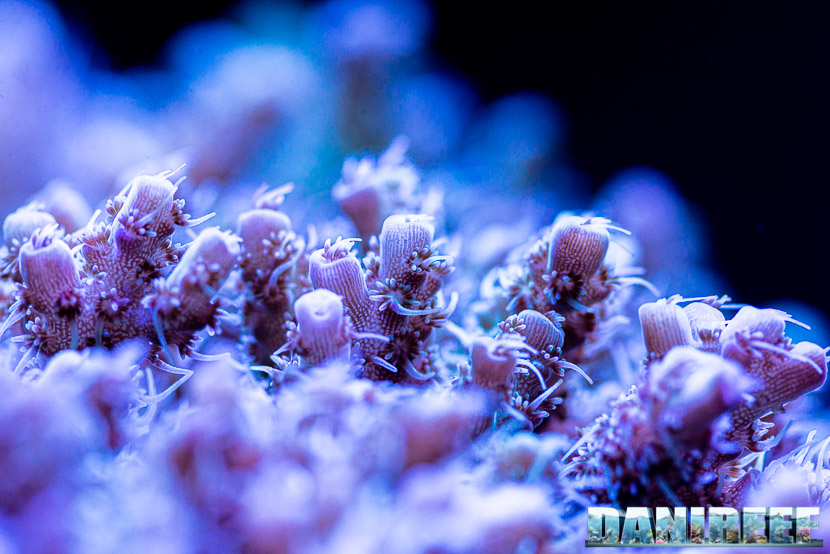
The routine managing, in addiction to the cleaning of the glass, Marco weekly changes about 15% of water. He uses osmotic water produced by the plant Aqpet 4PRO, helped by a booster pump that takes the water pression to about 8 bar, all handled by the control TDS. The water produced then is mixed with the 3 compounds Supreme Liquid Salt by Oceanlife and the liquid salt by OceanLife of which we’ve widely spoken in this article.
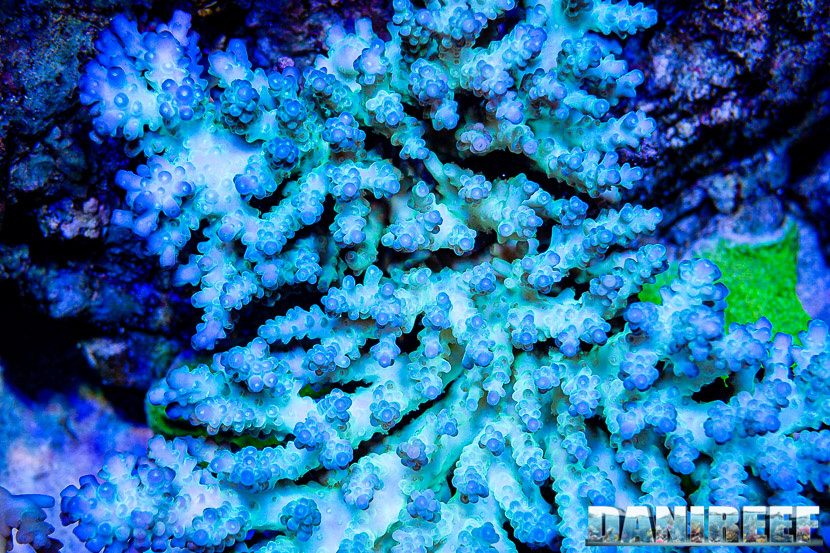
Feeding fish and corals in the marine aquarium of Marco Vank
It doesn’t exist an aquarium without an efficient feeding protocol of the corals that keeps them healthy. And the aquarium of Marco Vank is no exception.
For what regards the feeding of the SPS corals, Marco doesn’t have a predefined routine, but it’s calibrated on the weekly test’s results of No3 and Po4, by using the three liquid products Power 1, 2 and 3 produced in his trusted shop Hobby Acquari. Moreover, Marco sometimes uses various types of zoaplankton, among which Elos SVC and Nyos, and rarely directly feeds the LPS with solid food. But he said that he doesn’t like it because 90% of times the food is ransacked by shrimps and snails or, if administer during the day, by the fish.
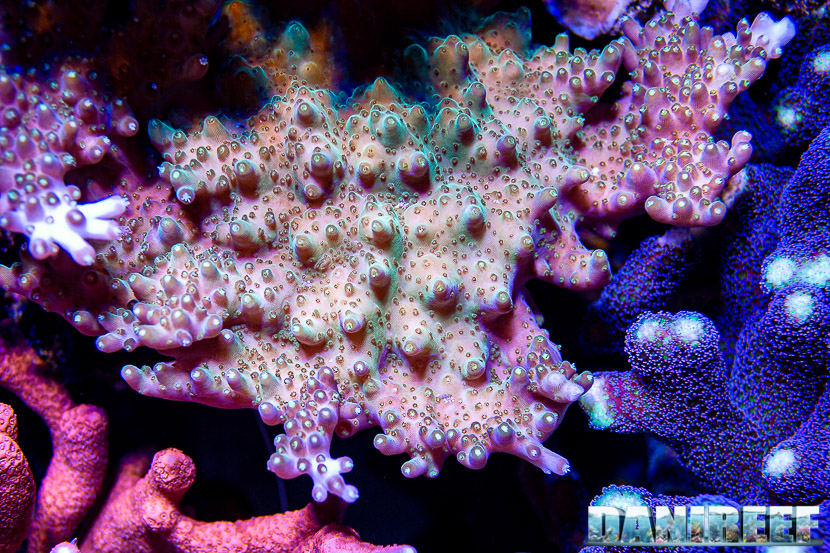
While, talking about the fish, Marco Vank says that he likes feeding them abundantly, in fact they’re very plump. As well as for the corals Marco prefers to differ their alimentation. He principally uses the granular feed Vitalis (review) and Ocean Nutrition, the pills Marine Grazer Mini (review) by Vitalis, spirulina by Ocean Life, freeze dried artemia from Sera, and lately even Integra Powder by AGP Unica.
But thet’s not the end because Marco also administer a great amount of Nori seaweed enriched with garlic, by Ocean Nutrition.
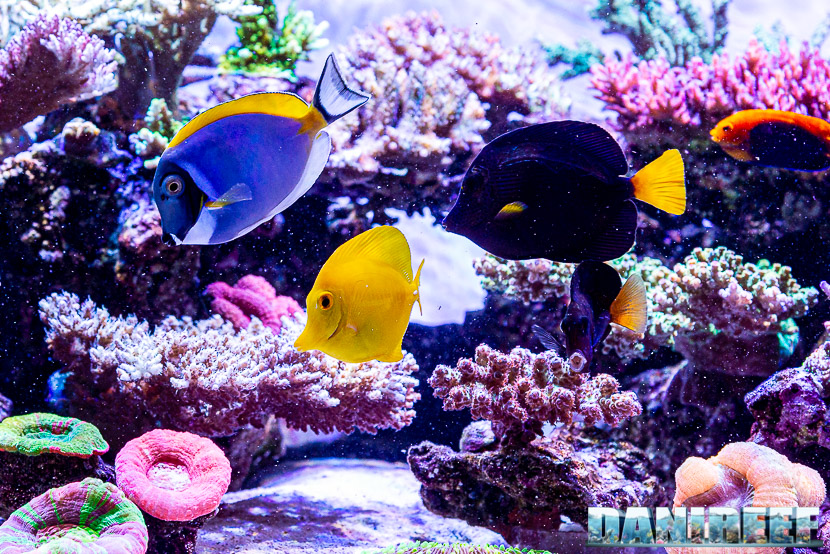
Marco then told us that differently from the first times, when he dosed important qualities of frozen food, like artemia, lobster eggs or zoaplankton, he then reduced very much because he has noticed that the Ctenochaetus hawaiiensis after eating tended to have fin infections. He believed it depended on a too much proteic diet, so he eliminated the problem.
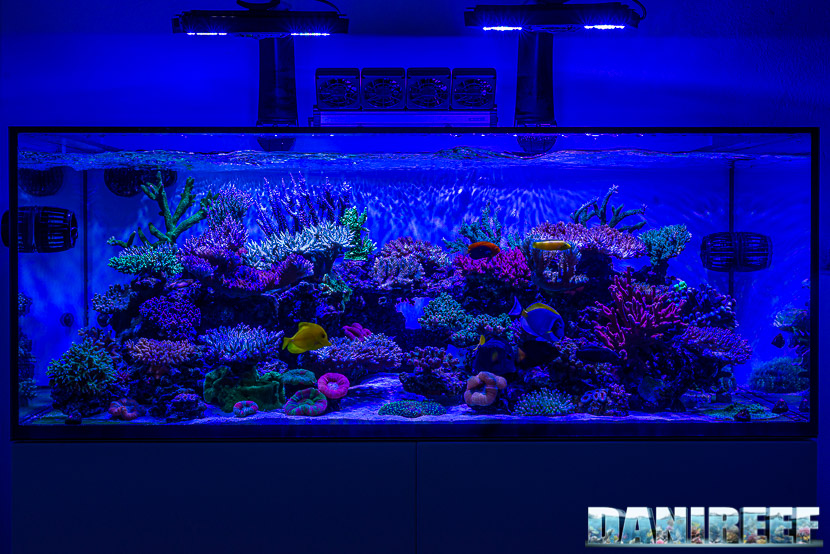
Curiosity
The aquarium project, Marco tells, was born in order to host exclusively SPS, in fact it has about fifty Acroporas, mainly australian, but then he has got interested (even if less) into some LPS, in particular scolymias, trachyphyllias, Lobophyllias, Fungias and acanthastreas, having in total about twenty LPS.
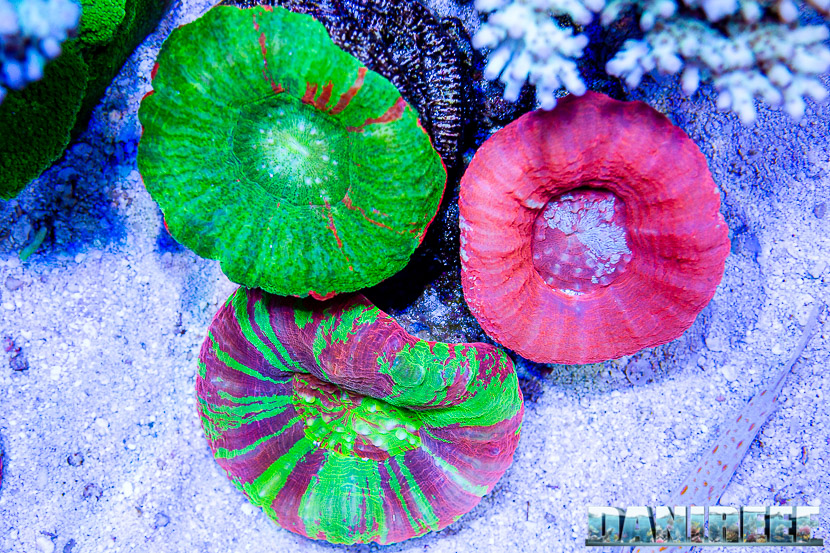
DaniReef’s comment
This is a textbook aquarium. It’s perfect technically speaking and its animals are banging. It has all it needs. The sump is perfect, the forniture beautiful and the technical part incredible! The management of resources and the various elements is perfect to the millimeter, and it’s very well obvious the passionate work of Marco Vank.
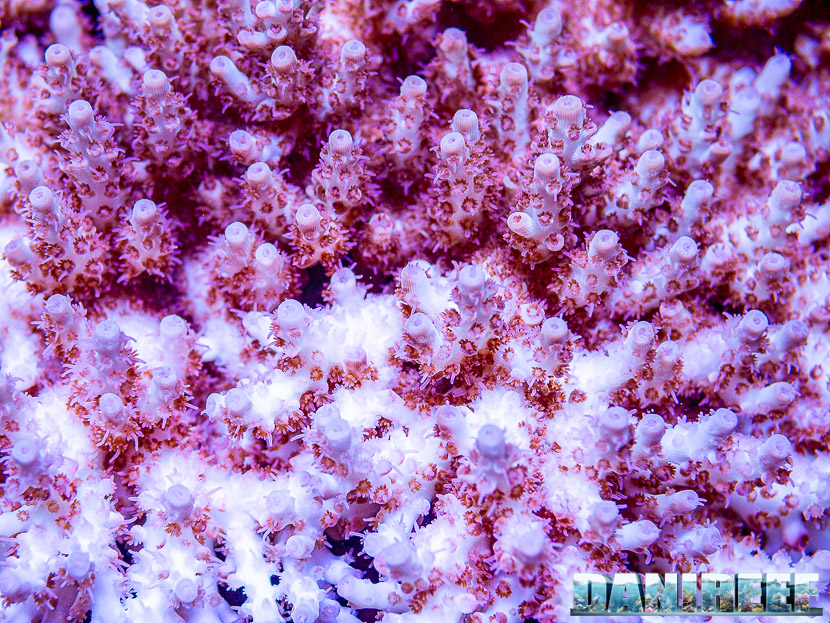
The lighting is really good, even if it’s always very difficul to take a picture of the aquarium when it has the Radion above. But the result is still stunning, don’t you think?
We also asked Marco which configuration of lights he uses and he sent us the values. A suggestion for you readers: don’t apply it to your aquariums without a graduated passage.
- channel 1: cool white – 8 led: 55%
- channel 2: deep blue – 8 led: 100%
- channel 3: blue – 8 led: 100 %
- channel 4: green – 4 led: 20%
- channel 5: photographic red – 4 led: 5%
- channel 6: UV – 8 led: 100%
- channel 7: purple – 4 led: 100%
- channel 8: warm white – 2 led: 55%
Total intensity: 100%.
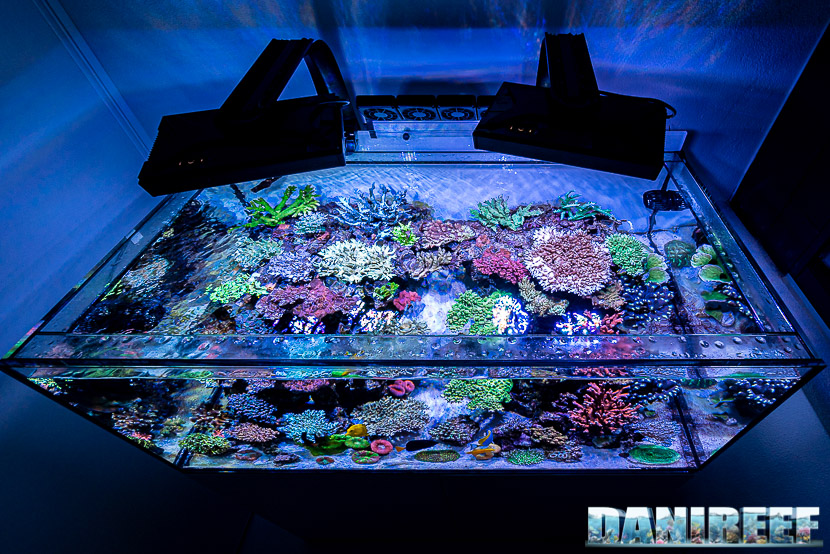
The movement is very strong, and this promotes the health of the aquarium and its animals. I remember you that’s 37 times the aquarium’s volume, alternating the two pumps. Maybe the only flaw is that the return pump should be more powerful in order to use better that wonderful skimmer hidden inside the cabinet.
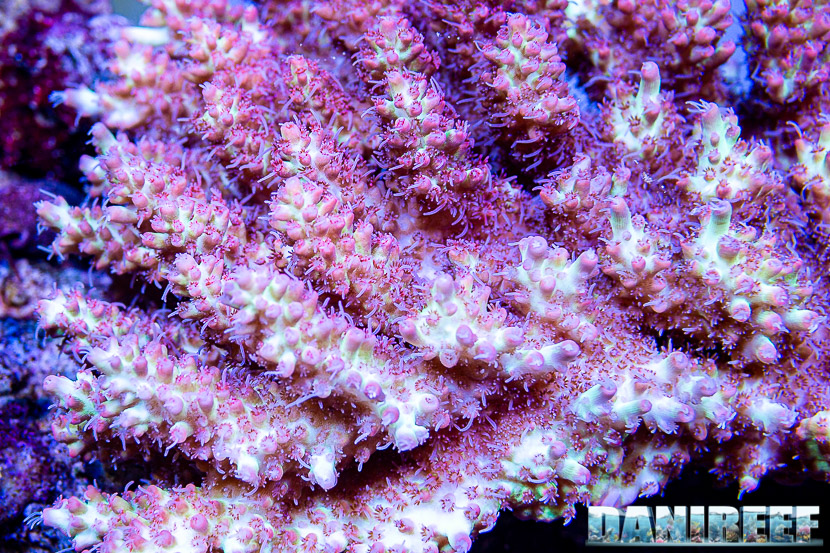
The alimentation plan, both for fish and corals, it’s very good, if not the best, because it feeds every biological species in the aquarium, and the fish are all fat and healty, if we don’t take account of the problem of the Zebrasoma xanthurum, but neither Marco, nor us, know the causes. It seems a skin problem, but we don’t know more. Speaking of the multitude of fish, in the next pages you’ll find them photographed separately.
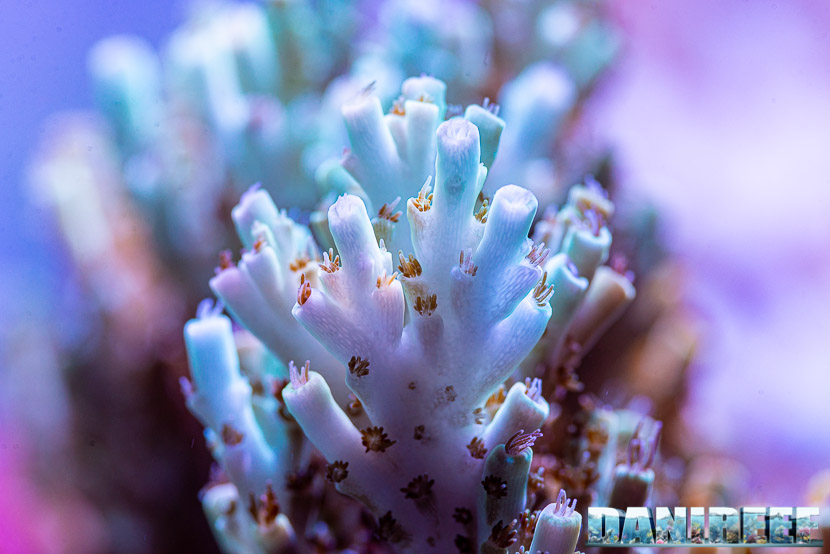
We invite you to continue on page two to see the photos of fish and corals.







